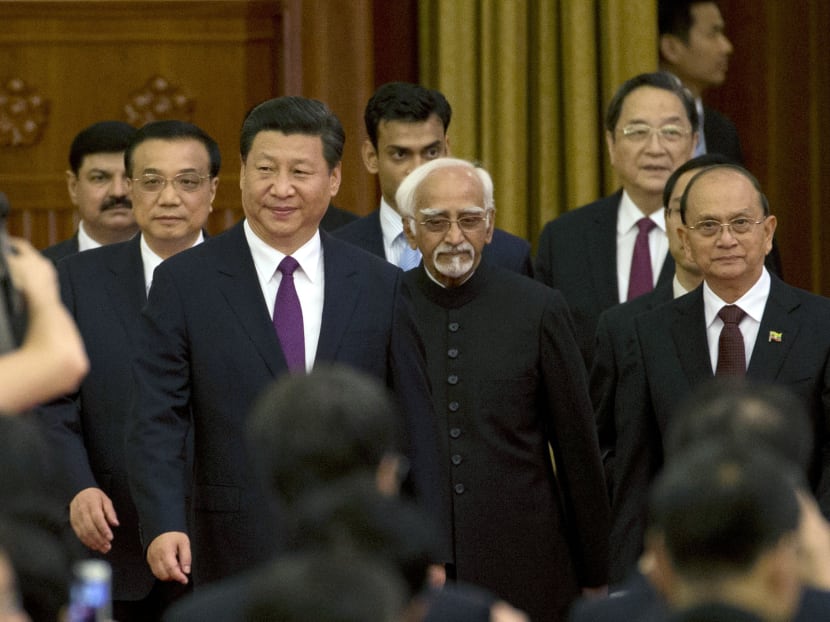China will never seek regional hegemony: Xi
BEIJING — Chinese President Xi Jinping has said his country will never seek hegemony no matter how strong it becomes, even while his neighbours worry about Beijing’s actions in several territorial disputes.

(From left): Chinese Premier Li Keqiang, Chinese President Xi Jinping, Indian Vice-President Hamid Ansari and Myanmar President Thein Sein at the Great Hall of the People in Beijing on Saturday. Photo: AP
BEIJING — Chinese President Xi Jinping has said his country will never seek hegemony no matter how strong it becomes, even while his neighbours worry about Beijing’s actions in several territorial disputes.
While pledging a rising China’s commitment to peace, Mr Xi also suggested that the dominance of great powers belonged to the past, an apparent veiled attack on the United States.
Speaking to about 700 people in Beijing’s Great Hall of the People, including Myanmar President Thein Sein and Indian Vice-President Mohammad Hamid Ansari, Mr Xi said: “China does not subscribe to the notion that a country is bound to seek hegemony when it grows in strength. Hegemony or militarism is not in the genes of the Chinese. China will unswervingly pursue peaceful development because it is good for China, good for Asia and good for the world.”
And in what appeared to be a dig at the US, Mr Xi said: “The notion of dominating international affairs belongs to a different age and such attempts are doomed to failure.
“Flexing military muscle only reveals a lack of moral ground or vision, rather than reflecting one’s strength.”
Mr Xi also called for “a new architecture of Asia-Pacific security”. He has said such a security arrangement would include Russia and Iran and exclude the US.
China is quarrelling with several countries, including India, over territory and is challenging US power in the region. In November, China declared an Air Defence Identification Zone over much of the East China Sea, where it is disputing several islands with Japan.
In the South China Sea, tensions with Vietnam have flared after China deployed oil rigs in waters claimed by both countries, and with the Philippines, where Beijing has asserted its sovereignty close to the Philippine shore. The US has said it has a national interest in sustaining open navigation and trade through the strategic waters in the South and East China seas.
Mr Xi made the comments on Saturday as he hosted the leaders of India and Myanmar to commemorate 60 years since their countries agreed to principles of peaceful coexistence.
In 1954, China, India and Myanmar, then known as Burma, signed the Five Principles of Peaceful Coexistence, promising mutual non-aggression and non-interference in internal affairs, ideals then incorporated into the Non-Aligned Movement of countries which did not wish to choose between the US and the Soviet Union.
The Chinese President was warm in his praise for India, whose new Prime Minister Narendra Modi is seeking to strengthen India’s armed forces and economy, in part to enable him to react more decisively in foreign relations than his predecessor, the mild-mannered Mr Manmohan Singh.
Mr Xi also noted that Myanmar, whose President has irritated China by suspending a major Chinese-invested dam project and seeking closer ties with the US, was the first country to sign a border agreement with China, in 1960. Mr Xi, Mr Thein Sein and Mr Ansari pledged to work to preserve regional peace.
Associate Professor Li Mingjiang at the S Rajaratnam School of International Studies in Singapore told the South China Morning Post that Mr Xi’s remarks indicated that “there is not much common ground between China and the US in the region other than avoiding major conflicts between the two big powers”.
Assoc Prof Li said that, while China wanted to counter its aggressive image, “there is a perception that what China is doing is different from what it says”. AGENCIES





